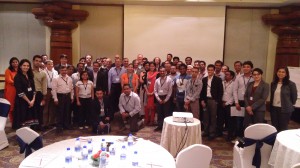
Working closely with the UK Space Agency, UKTI, and AcceleratorIndia we identified key players in the UK and India space sector (from the established to new start-ups) with the objective of building a better understanding of the UK and Indian space sector ecosystem. Both UK and India have complementary strengths in this exciting sector. The strength of the UK space sector is underpinned by the size of the sector – currently worth over £11 billion a year to the UK economy supporting tens of thousands of jobs. The UK has an ambitious target of achieving 10% of the global space sector by 2030 and identified satellites as being one of the ‘eight great technologies’, driven by the Satellite Applications Catapult centre in Harwell Oxfordshire. India’s space programme is growing and recognised as one of the global leaders with recent achievements including the Mars Orbiter Mission, also called Mangalyaan. It has good launch capabilities, ambitions to fly low cost space missions and has a good track record in using space for development. The UK is good in microsatellites, instrumentation and commercialising benefits from space especially through the clustering of expertise around the Satellite Applications Catapult centre. The UK Space Agency and India’s Indian Space Research Organisation has already established close co-operation through a MoU signed four years ago. So the building blocks are there to catalyse existing and new interactions into commercial and collaborative opportunities.
Throughout the day about there was a stream of stimulating and vibrant discussions on how the Indian private sector was increasingly looking at this space ecosystem for more commercial opportunities. India has its own space programme and over 500 Indian companies support the current space supply chain, which the Indian government hope will drive the ‘Make in India’ policy. We had excellent presentations from Dhruva Space (Involved in developing an indigenous small satellite platform with a primary focus on assembly, integration, testing and operation of satellites), Team Indus (Team Indus is India’s only entry for the Google Lunar XPRIZE), Aniara Space (satellite communication services company ) and Multiversal Technologies (has developed ionic thrusters for micro and nano satellites) On the UK side we had several representatives including CRFS, Oxford Space Systems and Deimos Space UK. This heady mix of space (sector) exploration made for an excellent Riffstream# event expertly curated by our long-time collaborator Dr Uday Phadke of AcceleratorIndia. Whether it was micro- or nano- satellites, commercial launch facilities, or downstream space application products (GIS, tracking movement of assets, Internet of Things) it gave rise to plenty of ideas and knowledge transfer.
What I am sure of is there are significant opportunities in this sector that requires us to bridge the knowledge gap between players on both sides and look at the role that clustering can play in doing that. A copy of the workshop report can be downloaded here and I am sure there will be further excellent opportunities for collaboration. So watch this space!
